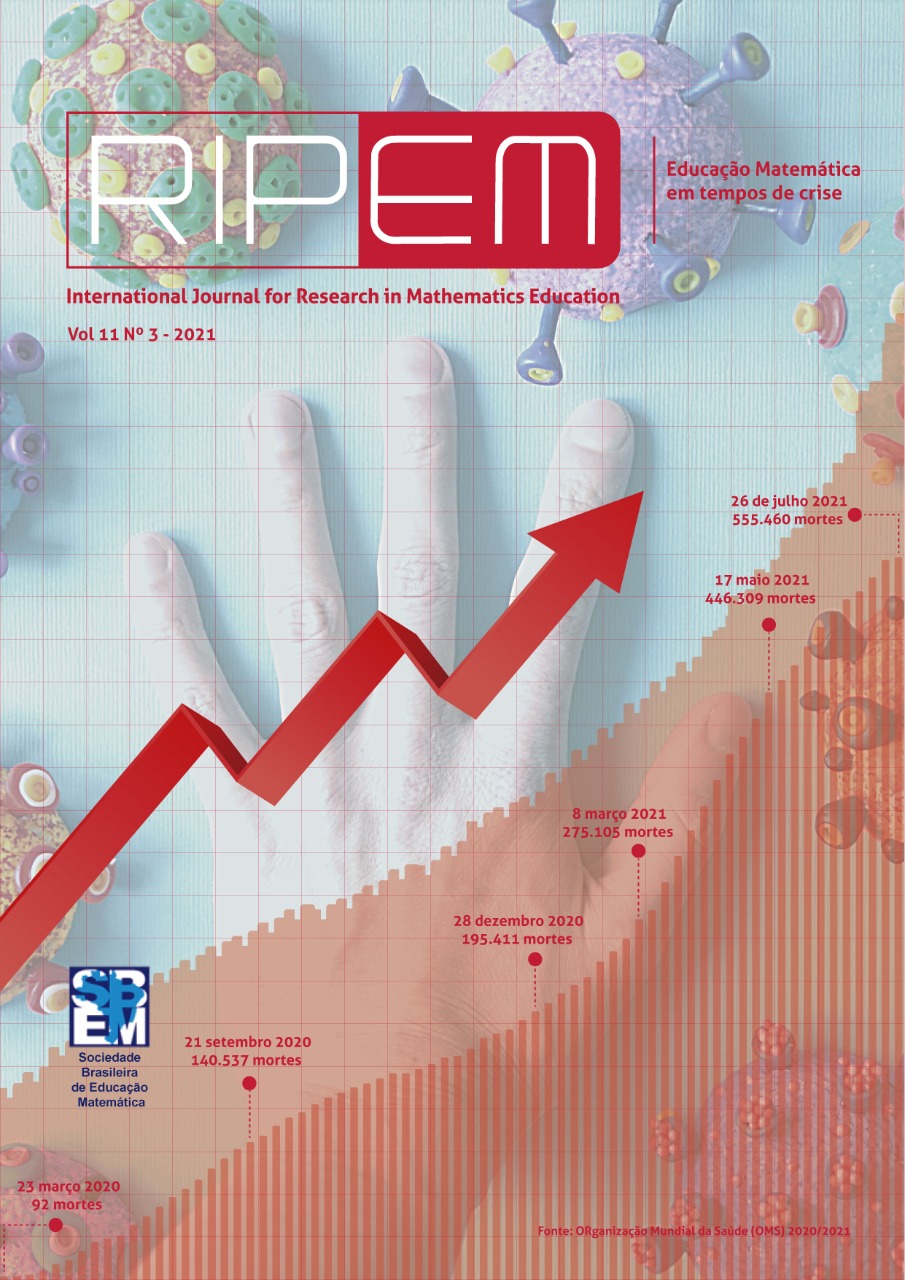Productive networks of knowledge/power: gender and Mathematics on student analysis
DOI:
https://doi.org/10.37001/ripem.v11i3.2833Keywords:
Gender, Mathematics, Discourse Analysis, Knowing, PowerAbstract
This paper presents some of the results of an investigation whose development in the initial stage took place with ten students from the ninth year of elementary school and the first year of high school who participated in a preparatory course for admission to the Federal Institute of Minas Gerais. This work is part of the research project entitled “Where do we learn to live the genre? In math classes!”. In this excerpt, the aim was to understand how students understand and experience gender issues in their daily lives [school, but not only], especially in their consequences and relations with mathematics as a science. The results presented here are from two meetings held virtually with students due to the Covid-19 pandemic. From an understanding of the mathematics curriculum as a space-time boundary between knowledge, seeking support in postcolonial theories, the question “what does mathematics have to do with gender issues?”, opened the meetings and led the selection of materials that had the role of triggering the discussions, such as news circulating in the media, research results presented in several reports dealing with the theme and institutional videos that address the themes relevant to the development of the investigation. All the work of construction and data treatment was carried out in the light of Foucault's discourse analysis. In this text, two statements will be presented, namely: “the [invisible] contribution of women to the development of society” and “women do not like mathematics”. Both statements were treated from an understanding of gender as discursively produced, in a Butlerian understanding of the term and of school mathematics as cultural policy. This qualitative research revealed that gender performances are still markedly stereotyped in the students' experiences, while there is an ascending process of engagement and questioning of the spaces to which the bodies that perform the feminine can or cannot, occupy, spaces in which mathematical knowledge predominates, for example. Therefore, these spaces are problematized by students participating in the research, fraying the boundary between knowledge.
Downloads
References
Butler, J. (2010) Problemas de gênero: feminismo e subversão da identidade. Civilização Brasileira.
Butler, J. (2020) Corpos que importam: Os limites discursivos do “sexoâ€. N-1 edições.
Fischer, R. M. B. (2001) Foucault e a Análise do Discurso em Educação. Cadernos de Pesquisa, (114)
Fischer, R. M. B. (2003) Foucault revoluciona a pesquisa em educação? Perspectiva, Florianópolis, 21(2).
Foucault, M. (1998). MicrofÃsica do Poder. In R. Machado (Trans.), 1979 (13th ed., Vol. 7). Edições Graal.
Foucault, M. (2014) Ditos e Escritos IX: genealogia da ética, subjetividade e sexualidade. Forense Universitária.
Foucault, M. (2020) História da sexualidade 2: O uso dos prazeres. Paz e Terra.
Leder, G. (1992) Mathematics and gender: Changing perspectives. In D. A. Grouws (Ed.), Handbook of research on mathematics teaching and learning (597–622). Macmillan.
Louro, G. (2014) Gênero, sexualidade e educação: uma perspectiva pós-estruturalista. Vozes.
Louro, G. (2020) Um corpo estranho: ensaios sobre a sexualidade e a teoria queer. Autêntica Editora.
OECD. (2013) PISA 2012 Results: What Students Know and Can Do (Volume I): Student Performance in Mathematics, Reading and Science, OECD Publishing.
Macedo, E. (2006) CurrÃculo: PolÃtica, Cultura e Poder. CurrÃculo sem Fronteiras, 6 (2), 98-113.
Martin, D. B. (2007) Mathematics learning and participation in the African-American context: The co-construction of identity in two intersecting realms of experience. In: Nasir; N. S.; Cobb, P. (Eds.) Improving Access to Mathematics, 146-158. Teachers College Press.
Mead, M. (1971) Macho e fêmea. Editora Vozes.
Neto, V. (2019) Quando aprendo matemática, também aprendo a viver no campo? Mapeando subjetividades. Tese (Doutorado) – Universidade Federal do Mato Grosso do Sul, Pró-Reitoria de Pós-Graduação (PRPG), Programa de Pós-Graduação em Educação Matemática, Campo Grande.
Neto, V.; Guida, A. M. (2020) Constituição do Sujeito-mãe nos Livros Didáticos de Matemática da Educação do Campo. Educação, 45.
Neto, V.; Batista, R. (2020) Problematizando a Agenda da Educação 2030: Relatório da UNESCO, Relações de Gênero, Educação STEM e Direitos Humanos. Revista de Educação Matemática, 17.
Nunes Viana, B. L., & Viola dos Santos, J. R. . (2021). Um Convite para Encontros com Escolas Outras. Revista Internacional De Pesquisa Em Educação Matemática, 11(2), 153-172.
Organization for Economic Co-Operation and Development [OECD]. (2013) PISA 2012 assessment and analytical framework: Mathematics, reading, science, problem solving and financial literacy. Paris: OECD Publishing.
Sachet, B., & Rosa, M. (2021). A Concepção de Gênero por Meio de Memes em uma Aula de Matemática: uma análise sob as lentes da decolonialidade. Revista Internacional De Pesquisa Em Educação Matemática, 11(2), 105-124.
Souza, M. C. R. R.; Fonseca, M. C. F. R. (2010) Relações de Gênero, Educação Matemática e discurso: enunciados sobre mulheres, homens e matemática. Autêntica Editora.
Valero, P. (2017) Mathematics for all, economic growth, and the making of the citizen-worker. In T. S. Popkewitz, J. Diaz, & C. Kirchgasler (Eds.), A political sociology of educational knowledge: Studies of exclusions and difference (117- 132). New York: Routledge.
Valero, P. (2018) Human Capitals: School Mathematics and the Making of the Homus Oeconomicus. In: Journal of Urban Mathematics Education, 11 (1&2).
UNESCO (2018). Decifrando o código: educação de meninas e mulheres em ciência, tecnologia, engenharia e matemática (STEM). Organização das Nações Unidas para a Educação, a Ciência e a Cultura, 7, place de Fontenoy, 75352 Paris 07 SP, França, e pela Representação da UNESCO no Brasil.
Published
How to Cite
Issue
Section

This work is licensed under a Creative Commons Attribution-NonCommercial-NoDerivatives 4.0 International License.








